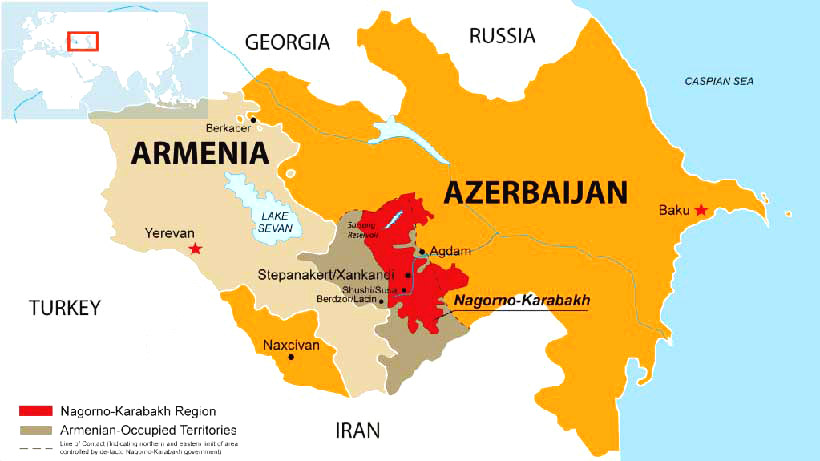International Relations
Nagorno-Karabakh Region
- 24 May 2022
- 6 min read
For Prelims: Nagorno-Karabakh Region, INSTC
For Mains: Effect of Policies & Politics of Countries on India's Interests
Why in News?
Recently, protests against possible concessions by Armenia over Nagorno-Karabakh which is disputed with neighboring Azerbaijan, have increased.
- In September 2020, clashes broke out that rapidly escalated to become the deadliest since the 1990s.
What is Nagorno-Karabakh Region?
- About:
- Nagorno-Karabakh is a mountainous and heavily forested region that under international law is recognised as part of Azerbaijan.
- However, ethnic Armenians who constitute the vast majority of the population there reject Azeri rule (the legal system of Azerbaijan).
- After Azerbaijan’s troops were pushed out of the region following a war in the 1990s, these ethnic Armenians have been in administrative control of Nagorno-Karabakh, with support from Armenia.
- Nagorno-Karabakh is a mountainous and heavily forested region that under international law is recognised as part of Azerbaijan.
- Strategic Significance:
- The energy-rich Azerbaijan has built several gas and oil pipelines across the Caucasus (the region between the Black Sea and the Caspian Sea) to Turkey and Europe.
- Some of these pipelines pass close to the conflict zone (within 16 km of the border).
- In an open war between the two countries, the pipelines could be targeted, which would impact energy supplies and may even lead to higher oil prices globally.
What is the Genesis of the Conflict?
- Background of the Conflict: The conflict can be traced back to the pre-Soviet era when the region was at the meeting point of Ottoman, Russian and the Persian empires.
- Once Azerbaijan and Armenia became Soviet Republics in 1921, Russia (erstwhile Sovient Union) gave Nagorno-Karabakh to Azerbaijan but offered autonomy to the contested region.
- In the 1980s, when the Soviet power was receding, separatist currents picked up in Nagorno-Karabakh. In 1988, the national assembly voted to dissolve the region’s autonomous status and join Armenia.
- However, Azerbaijan suppressed such calls, which led to a military conflict.
- Flash Point of Conflict: The self-declaration of independence by Nagorno-Karabakh in September 1991 in the backdrop of an imminent collapse of the USSR resulted in a war between Azerbaijan and Nagorno-Karabakh — supported by Armenia.
- Ceasefire: This clash lasted till a ceasefire agreement was reached in 1994, mediated largely by Russia. Since then, the Organization for Security and Co-operation in Europe (OSCE) Minsk Group co-chaired by the USA, Russia and France have engaged Azerbaijan and Armenia extensively to resolve the conflict.
- By that time, Armenia had taken control of Nagorno-Karabakh and handed it to Armenian rebels.
What is the Role of India?
- With Armenia, India has a friendship and cooperation treaty (signed in 1995), which, incidentally, would prohibit India from providing military or any other assistance to Azerbaijan.
- In the case of Azerbaijan, ONGC/OVL has made investments in an oilfield project in Azerbaijan and GAIL is exploring the possibilities of cooperation in LNG.
- Azerbaijan also falls on the International North South Transport Corridor (INSTC) route, connecting India with Russia through Central Asia.
- It can also connect India with Turkey and beyond through the Baku-Tbilisi-Kars passenger and freight rail link.
- Armenia extends its unequivocal support to India on Kashmir issue whereas Azerbaijan not only opposess but also promotes Pakistan’s narrative on this issue.
- India does not have a publicly articulated policy for the South Caucasus — unlike “Neighbourhood First”, “Act East” or “Central Asia Connect”.
- The region has remained on the periphery of its foreign policy radar.
Way Forward
- The conflict is essentially a conflict between two international principles viz. the principle of territorial integrity advocated by Azerbaijan and the principle of the right to self-determination invoked by Nagorno-Karabakh and supported by Armenia.
- India has every reason not to support Azerbaijan’s territorial integrity as Azerbaijan has shown scant regard for India’s territorial integrity violated by Pakistan in Jammu and Kashmir.
- At the same time, it is difficult for India to publicly endorse Nagorno-Karabakh is right for self-determination in view of the possible repercussions it can have repercussions for India as its adversaries like Pakistan may misuse it not only by making erroneous connections with Kashmir but also re-ignite secessionist movement in certain parts of India.





